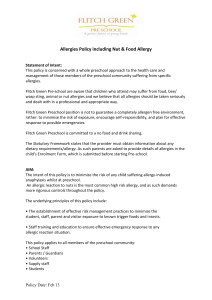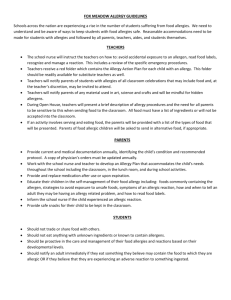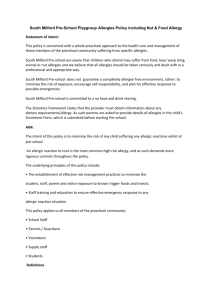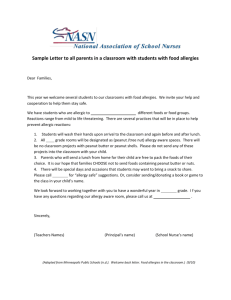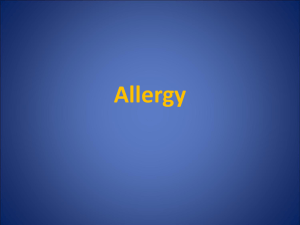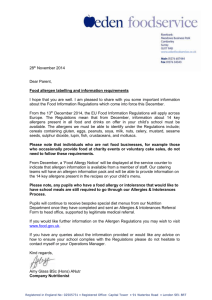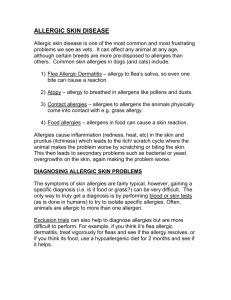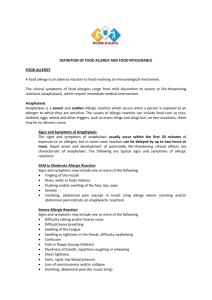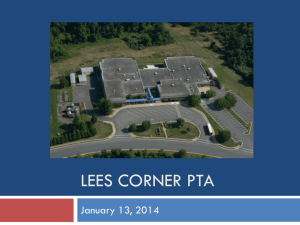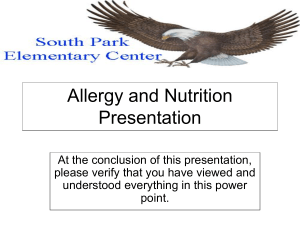Allergy - Maynard Montessori
advertisement
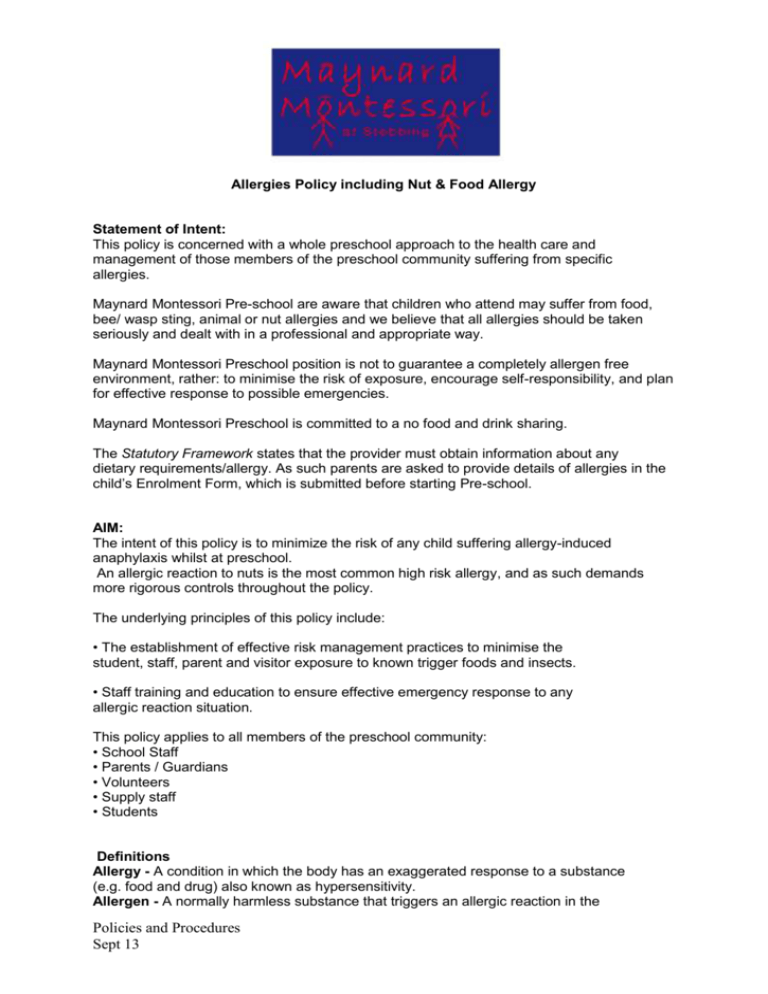
Allergies Policy including Nut & Food Allergy Statement of Intent: This policy is concerned with a whole preschool approach to the health care and management of those members of the preschool community suffering from specific allergies. Maynard Montessori Pre-school are aware that children who attend may suffer from food, bee/ wasp sting, animal or nut allergies and we believe that all allergies should be taken seriously and dealt with in a professional and appropriate way. Maynard Montessori Preschool position is not to guarantee a completely allergen free environment, rather: to minimise the risk of exposure, encourage self-responsibility, and plan for effective response to possible emergencies. Maynard Montessori Preschool is committed to a no food and drink sharing. The Statutory Framework states that the provider must obtain information about any dietary requirements/allergy. As such parents are asked to provide details of allergies in the child’s Enrolment Form, which is submitted before starting Pre-school. AIM: The intent of this policy is to minimize the risk of any child suffering allergy-induced anaphylaxis whilst at preschool. An allergic reaction to nuts is the most common high risk allergy, and as such demands more rigorous controls throughout the policy. The underlying principles of this policy include: • The establishment of effective risk management practices to minimise the student, staff, parent and visitor exposure to known trigger foods and insects. • Staff training and education to ensure effective emergency response to any allergic reaction situation. This policy applies to all members of the preschool community: • School Staff • Parents / Guardians • Volunteers • Supply staff • Students Definitions Allergy - A condition in which the body has an exaggerated response to a substance (e.g. food and drug) also known as hypersensitivity. Allergen - A normally harmless substance that triggers an allergic reaction in the Policies and Procedures Sept 13 immune system of a susceptible person. Anaphylaxis - Anaphylaxis, or anaphylactic shock, is a sudden, severe and potentially lifethreatening allergic reaction to food, stings, bites, or medicines. Epipen - Brand name for syringe style device containing the drug Adrenalin, which is ready for immediate inter-muscular administration. Minimized Risk Environment- An environment where risk management practices (e.g. Risk assessment forms) have minimised the risk of (allergen) exposure. Health Care Plan- A detailed document outlining an individual student’s condition treatment, and action plan for location of Epipen. Procedures and Responsibilities for Allergy Management General • The involvement of parents and staff in establishing individual Health Care Plans. • The establishment and maintenance of practices for effectively communicating a child’s healthcare plans to all relevant staff. • Staff training in anaphylaxis management, including awareness of triggers and first aid procedures to be followed in the event of an emergency. • Age appropriate education of the children with severe food allergies. Medical Information The school will seek updated information via medical form at the commencement of each calendar year. Furthermore, any change in a child’s medical condition during the year must be reported to the school. For students with an allergic condition, the School requires parents / guardians to provide written advice from a doctor (GP), which explains the condition, defines the allergy triggers and any required medication. The Preschool Leader will ensure that a Health care Plan is established and updated for each child with a known allergy. Teachers and teacher assistants of those students and key staff are required to review and familiarise themselves with the medical information Action Plans with a recent photograph for any students with allergies will be posted in relevant rooms with parental permission. Where students with known allergies are participating in school excursions, the risk assessments must include this information. The wearing of a medic-alert bracelet is allowed by the PreSchool. Medical Information (EpiPens) Where EpiPens (Adrenalin) are required in the Health Care Plan: Policies and Procedures Sept 13 • Parents/ guardians are responsible for the provision and timely replacement of the EpiPens. • The EpiPens are located securely in relevant locations approved by the Preschool Leader. Parent's role Parents are responsible for providing, in writing, ongoing accurate and current medical information to the school. Parents to send a letter confirming and detailing the nature of the allergy; including: The allergen (the substance the child is allergic to) The nature of the allergic reaction (from rash, breathing problems to anaphylactic shock) What to do in case of allergic reaction, including any medication to be used and how it is to be used. Control measures – such as how the child can be prevented from getting into contact with the allergen. If a child has an allergy requiring an epipen, or the risk assessment deems it necessary, a “healthcare plan” must be completed and signed by the parents. It is the responsibility of the Parent to provide the Pre-school with up to date medication/ equipment clearly labelled in a suitable container. In the case of life saving medication like Epi-pens the child will not be allowed to attend without it. Parents are also required to provide up to date emergency contact information. Snacks and lunches brought into pre-school are provided by each child‘s Parent. It is their responsibility to ensure that the contents are safe for the child to consume. Parents should liaise with Staff about appropriateness of snacks and any foodrelated activities (e.g. cooking) Staff's role Staff are responsible for familiarising themselves with the policy and to adhere to health & safety regulations regarding food and drink. Policies and Procedures Sept 13 If a child’s Enrolment Form states that they have an allergy then a “healthcare plan” is needed. It must be in place before the child starts attending sessions. A risk assessment should be carried and any actions identified to be put in place. The Assessment should be stored with the child’s healthcare plan. Upon determining that a child attending Pre-school has a severe allergy, a team meeting will be set up as soon as possible where all Staff concerned attend to update knowledge and awareness of child’s needs. All Staff who come into contact with the child will be made aware of what treatment/medication is required by the Preschool Leader and where any medication is stored. All staff are to promote hand washing before and after eating. Snack time biscuits and snacks are monitored by Staff and are peanut, nut free and other allergens depending on the children attending. All staff should know the procedures at snack and lunch time to ensure the safety of children with allergies. However Staff cannot guarantee that foods will not contain traces of nuts. All tables are cleaned with an approved solution. Children are not permitted to share food. As part of the Staff first aid course, Epipen use and storage has been discussed. We may ask the Parent for a list of food products and food derivatives the child must not come into contact with. Emergency medication should be easily accessible, especially at times of high risk. Staff should liaise with Parents about snacks and any food-related activities. Actions In the event of a child suffering an allergic reaction: We will delegate someone to contact the child’s Parents. If a child becomes distressed or symptoms become more serious telephone 999 Keep calm, make the child feel comfortable and give the child space. If medication is available it will be administered as per training and in conjunction with the “Medication Policy”. If Parents have not arrived by the time ambulance arrives, a member of Staff will Policies and Procedures Sept 13 accompany the child to hospital. Role of other parents Snacks and lunches brought to the Pre-school by other Parents should be peanut and nut free. The preschool will ensure that parents are regularly reminded and will monitor the contents of lunchboxes and snack. The following procedures and documentation in relation to this policy are:- National Food trust and Food policy in schools. Statutory Framework for the Early Years Foundation Stage – Section 3- The Safeguarding and Welfare requirements- Food and Drink. Our Preschool Health & Safety and Risk Assessment Policy Managing Medicines in Schools and Early Years Settings (DfES 2005) http://publications.teachernet.gov.uk/eOrderingDownload/1448-2005PDF-EN-02.pdf Signed at trustees meeting............................................................................................. Date........................................................................... Adopted at staff meeting.............................................................................................. Date............................................................................ Review Date............................................................................................................................... Policies and Procedures Sept 13

